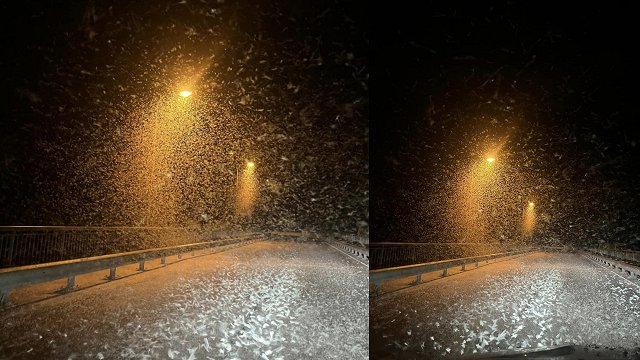Despite the blizzards we have just experienced, the breeding season has started all over Latvia. The same is true for a family of storks in Leimaņi parish, Jēkabpils municipality, where for the second year in a row the storks have built their nest on the chimney of the elderly Edīte Dzene, preventing her from heating the stove at home. This means that in harsher weather conditions, it is very cold in her home.
The house "Ērmītes" has several apartments, and therefore several stoves and chimneys. The house manager, JK Namu pārvalde Ltd, has put special structures on the chimneys to prevent the stork from building its nest, but the birds have won the day.
The lady's heart aches - while the stork's nest was still in the early stages of construction, she informed the building manager. "I called, my neighbor called. They didn't seem to care. We pay a lot of management money and we don't benefit," the lady said.
The manager's lack of interest in resolving the situation has resulted in the stork's masterpiece blocking the chimney of Edīte's home for the second year in a row. This means that she is not allowed to light her stove on the coldest days of spring, as the smoke comes inside. The firefighters have also told her that if anything happens, Edīte will be to blame.
"But it is cold at home. Especially now. They told me very nicely - buy a heater and keep warm. But who will pay for the electricity? The stork?" she said.
So in this battle with the stork, the victory is not on the senior's side.
The white stork, meanwhile, is sitting on the freshly hatched eggs. There are no answers to why the family has chosen Edīte's chimney to build its nest for the second year in a row. During the last cold days, Edīte again had to heat her home with an electric appliance, because if she heated the stove even slightly, the acrid smoke would quickly permeate the whole apartment. The stork's nest smokes too. But the bird does not seem to be bothered by the smoke.
Evija Andrušķeviča-Jonāne, Senior Expert at the Wild Species Conservation Unit of the Nature Conservation Agency, said:
"Storks, just like humans, tend to be very different, and there are storks that like to stay near or on chimneys, and they like the smoke."
She explained that it is difficult to fight the "urge" of some storks to smoke, and that the stork is stubborn and will fight to win its nest.
Meanwhile, the building manager explained that they had already received permission from the Nature Conservation Agency last year and had removed the stork's nest. This year, since the nest was built by the stork despite the enclosing structures, the company has reapplied to the Agency.
Aleksandrs Vītols, Manager of Buildings and Managed Territories at "JK Namu pārvalde" Ltd said: "The Nature Conservation Agency sent a permit which clearly states that the removal of a stork nest is not allowed if there are stork eggs or chicks in the nest at the time of the activity. In any case, the stork is breeding and it is not possible to do so at the moment. This will be considered before the end of the year when the storks will fly away. Then we will see how to resolve the issue."
The Nature Conservation Agency said that this year a total of seven permits have been granted in Latvia for the "extraction" of a stork's nest - as the law calls the removal of a nest. So, if a stork's nest is a nuisance to humans, its removal has to be agreed upon.
A spokeswoman for the Nature Conservation Agency said: "In practice, there have been no cases where someone actually moves the nest with all the eggs because, first of all, the nest is very heavy and is mostly just dismantled, and there have been cases where they try to move the eggs but the chicks die as a result of the move."
The Nature Conservation Agency reminds that private owners or building managers should think about stork nests in autumn, when the birds have flown away. Applications for the removal are welcome from September 1 until April 1. Last year, 20 such permits were issued.




























